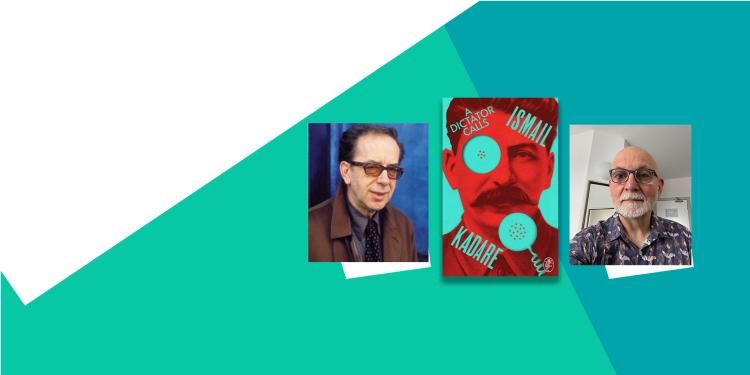

A Q&A with John Hodgson, translator of Ismail Kadare’s A Dictator Calls
With A Dictator Calls longlisted for the International Booker Prize 2024, we spoke to its translator about their experience of working on the novel – and his favourite books
Read interviews with all of the longlisted authors and translators here.
John Hodgson
How does it feel to be longlisted for the International Booker Prize 2024 – an award which recognises authors and translators equally – and what would winning the prize mean to you?
It is an honour, and a real pleasure to see translators recognised. This wasn’t always the case in the past. Translators are acquiring reputations in their own right. There are several translators from Russian and German and Spanish whose work I admire and look out for. If one of them has translated a book by a writer unknown to me, I reckon it’s probably well worth reading.
How long did it take to translate the book, and what does your working process look like? Do you read the book multiple times first? Do you translate it in the order it’s written?
This book took me about six months. I had read it when it was first published, without thought of translating it. When that time came, I started at the beginning and nibbled through, working for about two hours a day. Any longer than this, and my ear grows deaf.
Aside from the book, what other writing did you draw inspiration from for your translation?
A Dictator Calls is an Albanian book, but on a wide range of Russian literature, some of which I already knew and loved, especially Nadezhda Mandelstam’s memoirs, published in English as Hope Against Hope and Hope Abandoned. Nadezhda, the widow of the poet Osip Mandelstam, preserved her husband’s poetry after his death in the Gulag by learning it by heart, and eked out a precarious survival on the fringes of Soviet society. There is no finer testimony to the resilience of the creative spirit under totalitarianism.

John Hodgson
What was your path to becoming a reader – what did you read as a child and what role did storytelling play in your younger years? Was there one book in particular that captured your imagination?
As a child I loved historical novels such as Geoffrey Trease’sThe Crown of Violet, set in ancient Athens, and Rosemary Sutcliff’s The Eagle of the Ninth, about a lost Roman legion north of Hadrian’s Wall. I still love books that evoke a time and place.
Tell us about your path to becoming a translator. Were there any books that inspired you to embark on this career?
My first steps were very uncertain. Today there are a number of schemes that foster and mentor budding translators, and these are so valuable. Many years ago, I couldn’t understand why publishers’ eyes did not immediately brighten at the prospect of an Albanian novel. From the beginning, I wanted to translate Ismail Kadare, who has had a great influence in shaping the modern Albanian literary language, which I have also partly learned from him.
What are your reading habits under normal circumstances? Which book or books are you reading at the moment, and why?
What on earth are normal circumstances? I am an eclectic reader. I have crazes, and go off at tangents. I recently visited the far north of Canada, and I’m reading a lot about North America from an indigenous perspective, books such as Ned Blackhawk’s The Rediscovery of America. I’ve just finished Indian Horse, a novel by the Ojibwe writer Richard Wagamese.
Translated fiction enables us to view the world from very different points of view, often from apparently marginal perspectives
Which work of translated fiction do you wish you had translated yourself, and what aspects of this work do you admire most?
I think of Robert Chandler’s translation of Vasily Grossman’s Life and Fate, that vast panoramic novel of World War Two. How this translator must have immersed himself in this vividly recreated world, and what a harrowing experience it must have been!
Do you have a favourite International Booker Prize-winning or shortlisted novel and, if so, why?
There have been several Russians in the lists and I would like to single out Maria Stepanova’s In Memory of Memory (shortlisted in 2021), a subtle and highly original exploration of the connections between personal and historical past. Also the raucous and outrageous satires of Vladimir Sorokin, the winner in 2013, whom the judges selected for his entire body of work, without any submissions from publishers. Day of the Oprichnik has lost nothing in topicality since then. I hope to see his novel The Sugar Kremlin in English soon. It is after all already in Albanian.
What role do you think translated fiction plays in promoting a more inclusive and diverse literary canon, and how can we encourage more people to read it?
Translated fiction enables us to view the world from very different points of view, often from apparently marginal perspectives. Albania, for instance, has always been on the margins of empire. Prizes are signposts. They tell us, look, that is a great book, and you must try this other one too – it’s unlike anything you have read before.

- By
- Ismail Kadare
- Translated by
- John Hodgson
- Published by
- Harvill Secker












